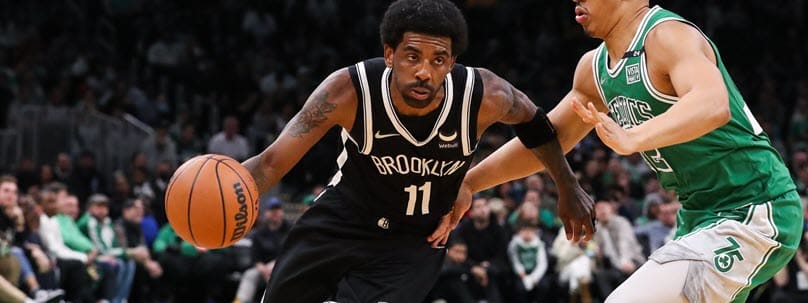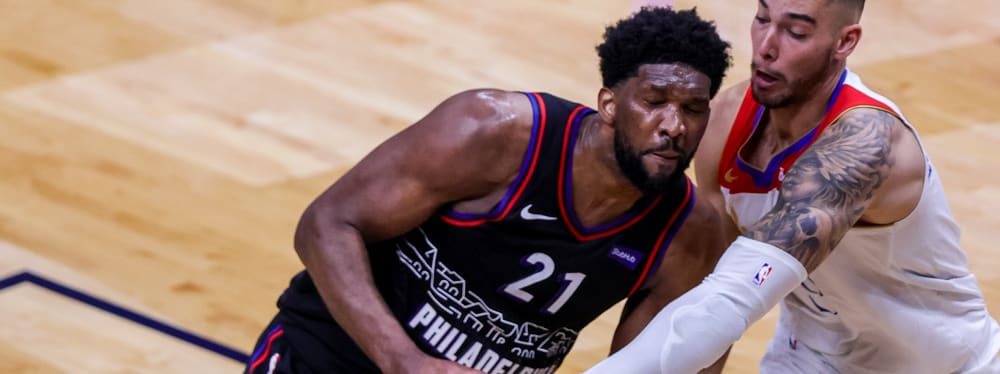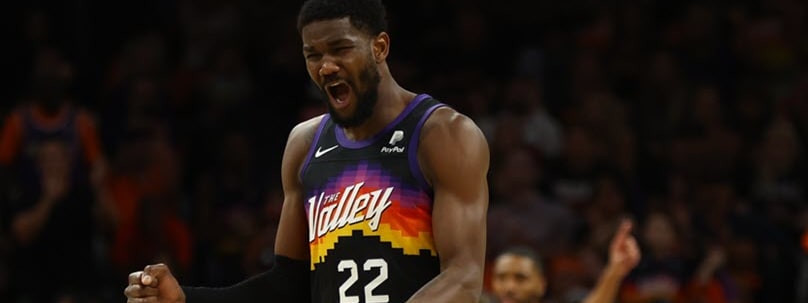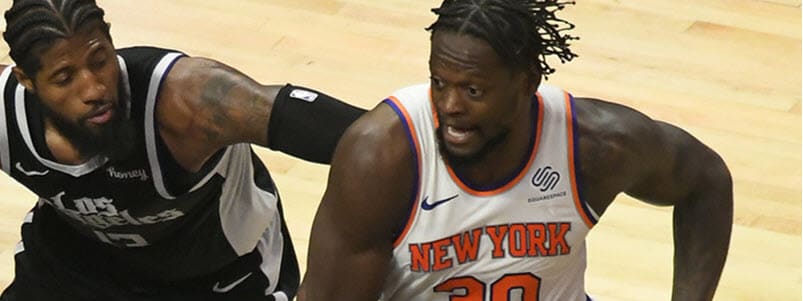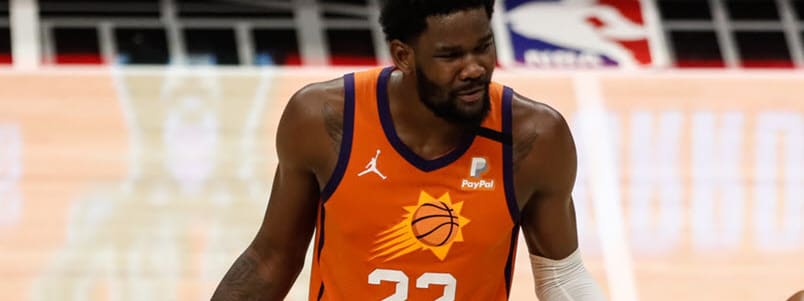Recent RotoWire Articles Featuring Kent Bazemore
See More
Bazemore's role fluctuated in his return to Golden State for the 2020-21 season. He was almost exclusively a reserve through his first 50 games, posting per-game averages of 6.0 points, 2.9 rebounds, 1.5 assists, 0.9 steals and 0.9 three-pointers over 16.8 minutes. The veteran swingman turned his season around after moving into the starting lineup on April 10, averaging 10.6 points, 5.0 boards, 1.9 dimes, 1.5 steals and 1.7 treys over 29.1 minutes the rest of the way. The late-season surge and multiple-category contributions helped Bazemore find his way onto the occasional fantasy squad and likely contributed to the Lakers' decision to acquire his services in the offseason. The move to Los Angeles gives Bazemore the chance to chase his first NBA title, but it does no favors to his fantasy value. He'll likely be one of the less-featured options among a host of reinforcements the team added in the offseason, and he could struggle to see enough playing time to carve out any fantasy value.
Bazemore started the 2019-20 season with the Trail Blazers after a June trade sent Bazemore from Atlanta to Portland (and Evan Turner to Atlanta). Bazemore appeared in Portland's first 43 games, with 21 starts. Over that span, he averaged 7.9 points, 4.0 rebounds, 1.4 assists and 1.0 steals over 25.8 minutes per game. On Jan. 21, the versatile wing was traded to the Kings. He played better with Sacramento, averaging 10.3 points, 4.9 rebounds, 1.3 assists and 1.2 steals in 23.1 minutes. He also shot 38.4 percent from three and hit 1.1 per game. Bazemore will be on another new team this season, as he signed a one-year contract with the Warriors. In Golden State, Bazemore figures to continue seeing reserve minutes at shooting guard and small forward, and it appears he's in line to garner minutes in the mid-20s. If that's the case, or if he can reach minutes in the upper-20s, Bazemore could be worth a late-round flier in some standard fantasy formats, though he's more likely a deep league option.
Bazemore will play for his fourth team after being traded to Portland for Evan Turner. In his final season with the Hawks, Bazemore compiled his second-best scoring (11.6) and rebounding (3.9) averages of his career, despite shooting just 40.2 percent from the floor and 32.0 percent from three -- his worst marks since his rookie season. Encouragingly, Bazemore was still a quality defender with 1.9 combined blocks/steals, and he's collected at least 1.8 blocks/steals in four straight seasons. His role was largely scaled back last year, as Bazemore played just 24.5 minutes per game and started only 35 of 67 appearances. The playing time represented a four-year low for the eight-year veteran who will hope to see his role grow in Portland. He'll vie for playing time with Rodney Hood and new additions Anthony Tolliver and Mario Herzonja, but if he can earn a steady rotational role with the Blazers, Bazemore has proven to be a reliable source of threes and defense in his career.
Bazemore was one of the top candidates to see a significant uptick in production when Paul Millsap, Dwight Howard and Tim Hardaway Jr. all departed last offseason. He ended up averaging a career-high 12.9 points, but that was only a minor increase in scoring and he didn't take as much of a step forward as most expected. Still, Bazemore chipped in across the box score with 3.8 rebounds, 3.5 assists and 1.5 steals, while knocking down 1.7 three-pointers at a career-best 39.4 percent clip. That occasionally made him a viable DFS option, as well as a productive all-around contributor in deeper season-long leagues. Most notably, Bazemore's 1.5 steals per contest placed him 14th in the league. The Hawks roster underwent some changes once again this offseason. Starting point guard Dennis Schroder was traded to the Thunder, while the Hawks added Jeremy Lin and selected both Trae Young and Kevin Huerter with the fifth and 19th overall picks, respectively, in the 2018 NBA Draft. Young figures to start at point guard right away and Lin is likely to operate as the team's sixth man, so look for Bazemore to reclaim the starting shooting guard role. He'll likely have no trouble reaching the 27.5 minutes he averaged last year, which means a similar stat line seems doable. That said, it is worth it to note that the Hawks could try and get a guy like Huerter more minutes as the season moves along, which could potentially cut into Bazemore's playing time late in the year. Either way, Bazemore's steal and three-point totals should continue to earn him a selection in the mid-to-late rounds of most drafts, so keep him on the Fantasy radar.
Bazemore's third season in Atlanta and fifth overall was once again set in a complementary role. With the likes of Paul Millsap and Dennis Schroder doing the bulk of the work offensively, as well as the emergence of Tim Hardaway Jr. as a scoring threat, Bazemore was nothing more than a role player for the Hawks. He did start 64 of the 73 games he played in and averaged 11.0 points, 3.2 rebounds, 2.4 assists, 1.2 steals and 1.3 three-pointers across 26.9 minutes. That was nearly an identical line from his 2015-16 campaign, though he did see a significant drop off as a free-throw shooter, going just 70.8 percent from the charity stripe compared to 81.5 the year prior. Looking ahead, Bazemore has a big opportunity in front of him. The Hawks no longer have Millsap, Hardaway Jr. or Dwight Howard, meaning three of the teams top four scorers are gone. That leaves just Schroder as a consistent threat from last season. Bazemore is fully expected to be one of the biggest beneficiaries in terms of his production, as the Hawks didn't do much in free agency to make up for the loss in talent. Bazemore is locked into a starter's role and is going to have the chance to be featured alongside Schroder. That should mean an increase in production across the board and gives him plenty of breakout potential, though his smaller role in the past could afford Fantasy owners the opportunity to grab him as a high upside player in the mid-to-late rounds. He could stand to improve a bit as a three-point shooter (34.6 percent from deep in 2016-17) and at the free-throw line, but his ability as a two-way player, as well as the increased opportunity overall could pay dividends for those that select him in Fantasy leagues.
After DeMarre Carroll bolted for Toronto last summer, the Hawks tabbed Bazemore as their starter at small forward, despite the 27-year-old having only 25 career starts under his belt and being quite undersized for the position at 6-foot-5. However, just as he has since going undrafted out of Old Dominion in 2012, Bazemore was able to exceed expectations, submitting a career-best campaign in multiple areas. He averaged 11.9 points, 5.1 rebounds, 2.3 assists, 1.5 three-pointers and 1.3 steals in 27.8 minutes per game while connecting on 81.5 percent of his free-throw attempts, a major improvement over his 68.3 percent career rate. Those numbers don't perfectly illustrate just how significant his impact was on the defensive end, where Bazemore guarded three positions and was effective in forcing turnovers while generally eschewing foul trouble. Bazemore's seamless transition from a low-end rotation role to a starting gig didn't go unnoticed from other teams this offseason, but the unrestricted free agent ultimately chose to remain in Atlanta on a four-year, $70 million pact. He'll again be locked into starting duties at small forward this season, though the additions of first-round picks Taurean Prince and DeAndre' Bembry, who can both play on the wing, might prevent Bazemore's minutes and production from climbing much higher.
In his third season, Bazemore contributed 5.2 points, 3.0 rebounds, 1.0 assist, 0.7 steals, and 0.4 blocks in 18 minutes per game through 75 regular season games. He shot 43 percent from the field, 36 percent from the three-point line, and 60 percent from the charity stripe. During 16 playoff games, the 6-5, 201-pound guard averaged 5.4 points, 3.3 rebounds, 0.8 assists, 0.7 steals, and 0.6 blocks in 19 minutes per game while shooting 42 percent from the floor, 21 percent from beyond the arc, and 68 percent from the free-throw line. The 26-year-old reserve is entering the final year of his contract, and given DeMarre Carroll's departure and Thabo Sefolosha's injury status, Bazemore could earn the chance to start alongside Jeff Teague, Kyle Korver, Paul Millsap, and Al Horford at the beginning of the year. Still, Sefolosha's eventual return, as well as the Hawks' offseason acquisitions of Tim Hardaway and Justin Holiday, means Bazemore will face stiff competition for minutes in 2015-16.
The deadline deal that sent Bazemore from the Warriors to the Lakers last season did wonders for his career. The second-year wing – an undrafted free agent out of Old Dominion – couldn't crack the Warriors' rotation, but thrust into a significant role on an injury-depleted Lakers team, Bazemore thrived. He averaged just 6.1 minutes in 44 games for the Warriors. However, as a Laker, he played 28 minutes per game in 23 games, scoring 13.1 points per game with 1.4 made three-pointers, more than three assists, and over a steal per game. After the season, he signed a two-year deal with the Hawks worth a reported $4 million. Of course, Atlanta is a much deeper team than the 2013-14 Lakers. Bazemore will be competing with the likes of Kyle Korver, Thabo Sefolosha, and DeMarre Carroll for minutes at shooting guard and small forward. Also worth noting is that coach Mike Budenholzer's system isn't nearly as fantasy-friendly as Mike D'Antoni's, which further diminishes Bazemore's fantasy stock.
As an undrafted free agent in 2012-13, Bazemore was used sparingly by the Warriors, averaging four minutes in 61 games. Not much more than that will be expected of him this season. He can shoot some, defend some, pass some and dribble some but doesn't have one skill that makes him stand out.
